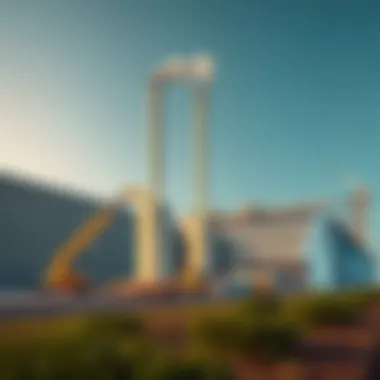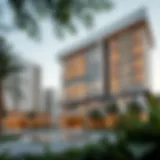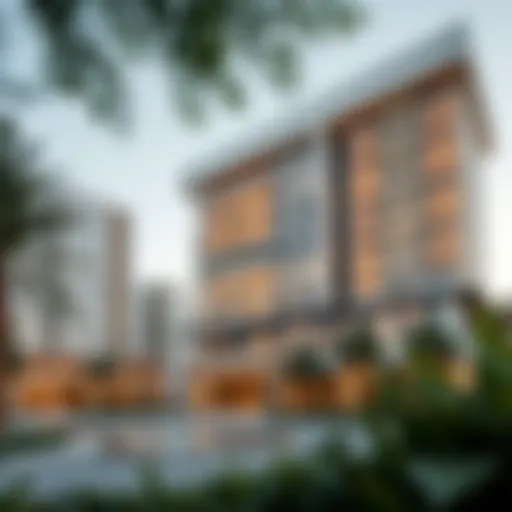Industrial Parks in Dubai: Key Insights and Trends


Intro
Dubai has carved its niche on the global stage as an economic powerhouse, and at its core lies a network of industrial parks that bolster economic activities. These zones are more than just warehouses and factories; they represent strategic hubs where innovation and commerce intersect. Understanding these parks is crucial for investors, developers, and businesses navigating the complexities of the Dubai market.
As urbanization and globalization escalate, Dubai's industrial parks are adapting to meet new demands. They not only support local businesses but also attract foreign investments, creating a competitive landscape for various sectors. A comprehensive exploration of these parks reveals insights into their functions, advantages, and the evolving trends shaping their future.
In the sections that follow, we will highlight key market trends and insights, detailing both the historical context and future expectations within this vital sector. We will also compare the different types of parks, their infrastructure, and the advantages they offer. This narrative serves as a guide for anyone looking to grasp the significance of industrial parks in Dubai, aiming to equip readers with valuable knowledge as they consider their investment strategies.
From examining current market dynamics to anticipating future opportunities, we aim to fully illuminate the intricate landscape of Dubai's industrial parks.
Prolusion to Industrial Parks in Dubai
Dubai has carved a niche as a stellar economic player in the global market, and its industrial parks stand at the heart of this transformation. They are not merely plots of land with factories; these parks serve as the lifeblood for various sectors, facilitating crucial operations and fostering innovation. Understanding why these spaces are significant is key for any stakeholder—be it investors, analysts, or developers.
Definition and Purpose
Essentially, industrial parks are specially designated zones used predominantly for manufacturing, logistics, and other industrial functions. These parks are designed with the purpose of streamlining operations—offering ready-made infrastructure so that businesses can hit the ground running. Companies in these areas benefit from shared facilities, easy access to transportation networks, and often favorable regulatory environments. This setup not only enhances productivity but also helps to keep operational costs in check.
A pivotal benefit is the way these parks encourage community among businesses. Picture a complex where companies share resources and support one another. This environment promotes collaboration and can lead to innovations that might not arise in isolation. Additionally, many industrial parks are situated within free zones, granting companies lucrative financial benefits, such as tax exemptions and full repatriation of profits.
Historical Context
Reflecting on the evolution of industrial parks in Dubai reveals more than just progress; it highlights a well-thought-out strategy orchestrated by the emirate to solidify its status as a regional powerhouse. Initially, the establishment of these parks took root in the late 1980s as the Dubai government aimed to shift its economy from an oil reliance to a more diversified one. The goal was clear: to lure foreign investment and create job opportunities for locals.
Swiftly, various zones emerged. Some focused on heavy industries while others catered specifically to technology and logistics, creating a space for every niche. The rapid growth of global trade and regional economic initiatives folded into this context, making Dubai not just a stopover but a destination for international business.
As we navigate through each aspect of these parks in the later sections, it becomes evident that the historical underpinnings shaped the robust ecosystem we see today. From state-of-the-art facilities to strategic locations, the design and management of these parks are reflections of a forward-thinking vision that seeks to dynamically integrate and evolve within the broader industrial landscape of the Middle East.
While the past provides insight into how these parks have come to be, it is the future possibilities and current operational frameworks that hold the most importance for today’s investors and stakeholders.
Types of Industrial Parks
Industrial parks serve as vital cogs in the machinery of Dubai’s economic growth. They’re not just simple collection points for warehouses or factories; they are well-planned ecosystems designed to boost productivity and create a favorable business environment. Understanding the various types of industrial parks available in Dubai is essential for investors, businesses, and stakeholders alike. Each type offers its own set of benefits, niche focuses, and specialized infrastructures that cater to different sectors. Here’s a closer look at the prominent types of industrial parks found in Dubai.
Free Zones
Free zones in Dubai present a unique opportunity for businesses to thrive. These zones are specially designed to attract foreign investment by allowing 100% foreign ownership, which is a significant draw for many international companies. Furthermore, free zones typically offer enticing tax incentives, such as zero corporate taxes and exemptions from import and export duties, setting the stage for enhanced profitability.
In addition to these financial perks, free zones often provide streamlined administrative procedures. This makes it easier for businesses to set up shop and get their operations running without the usual bureaucratic hurdles. A prime example is the Jebel Ali Free Zone, which not only stands as one of the largest free zones in the world but also boasts a strategic location near the major shipping port.
- Key Attributes of Free Zones:
- 100% foreign ownership
- No corporate taxes for a specified period
- Simplified business licensing and registration process
Free zones are crucial for fostering innovation and economic diversification, serving as launch pads for startups and established corporations alike.
Manufacturing Hubs
Manufacturing hubs are essential for driving Dubai's industrial output and showcasing its commitment to becoming a global manufacturing leader. These parks provide specialized infrastructure aimed at companies involved in production, assembly, and the manufacturing of goods. They often come equipped with heavy-duty utilities, dedicated logistics support, and access to skilled labor.
A key example is Dubai Industrial City, where businesses can leverage advanced facilities for various manufacturing sectors including building materials, food and beverage, and logistics. The strategic proximity to main transport networks further enhances the viability of manufacturing operations.
- Benefits of Manufacturing Hubs:
- Access to up-to-date technology and facilities
- Support for workforce training and development
- Close collaboration with other industries and tech firms
Investors looking at this segment must be aware that these parks are designed with the intent of facilitating optimized production processes. Each manufacturing hub's specific sector focus can influence the types of businesses that will benefit most from the facilities available.
Logistics Parks


Logistics parks in Dubai form the backbone of its trading infrastructure. Given its geographical location as a gateway between East and West, it’s vital for logistics firms to have established hubs that facilitate efficient transportation and warehousing. These parks are designed with customs clearance facilities, multimodal transport options, and extensive warehousing capabilities, ensuring speedy movement of goods.
Dubai South is a notable logistics park, catered to both air and sea cargo operations and equipped with comprehensive logistics solutions that streamline the supply chain process.
- Highlights of Logistics Parks:
- Integrated shipping and freight services
- Proximity to major transport hubs, such as airports and ports
- Advanced technology for tracking and inventory management
The efficiency provided by logistics parks not only enhances trade but also reduces operational costs for businesses, hence solidifying Dubai's reputation as a hub for global trade.
Technology Parks
The rise of digital innovations and technological advancements has led to the establishment of technology parks in Dubai. These parks aim to nurture tech-oriented businesses by providing an environment that fosters creativity, research, and development. Facilities often include labs, incubators, and co-working spaces tailored for tech startups and established companies.
Dubai Silicon Oasis stands out as a prime example of a technology park that attracts IT and tech firms. It offers not just physical infrastructure, but also incentives such as tax benefits and supportive ecosystems for research-driven businesses.
- What Technology Parks Offer:
- State-of-the-art research and development facilities
- Networking opportunities with other tech firms
- Government support for innovation and tech startups
Investing in technology parks aligns well with the UAE’s vision to diversify the economy and promote sustainable development through innovation.
Understanding the types of industrial parks in Dubai can help investors and businesses strategize effectively, tailoring their approach to the strengths of each park type.
Key Locations of Industrial Parks in Dubai
Dubai is a premier destination for industrial growth, and the strategic locations of its industrial parks play an essential role in this. Each park has unique features and advantages that contribute to its attractiveness to businesses and investors alike. Understanding these locations is key to navigating the industrial landscape in Dubai.
Jebel Ali Free Zone
The Jebel Ali Free Zone, often referred to as JAFZA, stands out as one of the largest free zones in the world. Covering over 48 square kilometers, this park serves as a critical gateway for trade between East and West.
- Logistics Hub: One of the main advantages of JAFZA is its proximity to the Jebel Ali Port, which is the largest container port in the Middle East. This advantageous location means reduced transportation costs and faster turnaround times for import and export activities.
- Business Incentives: 100% foreign ownership and no personal income taxes are major lures for businesses setting up shop here. Many multinational companies, including Microsoft and Procter & Gamble, have chosen JAFZA for their regional operations.
- Industry Diversity: The types of companies in JAFZA span various sectors from logistics to manufacturing and technology, creating a dynamic ecosystem that encourages collaboration and innovation.
Dubai Investment Park
Dubai Investment Park is another pivotal location in Dubai’s industrial framework. This area is specially designed to accommodate diverse industries, including manufacturing, logistics, and retail.
- Integrated Community: What sets this park apart is its mixed-use development structure that combines industrial, commercial, and residential spaces. This approach encourages a synergy between various business sectors and offers a holistic environment for local employees.
- Sustainable Practices: Dubai Investment Park prides itself on integrating sustainability into its operations, boasting eco-friendly practices that appeal to modern businesses. Investors looking for green initiatives will find a welcoming environment here.
- Accessibility: Located near major thoroughfares, such as Sheikh Zayed Road and Emirates Road, it facilitates easy access to other parts of Dubai and beyond, enhancing logistics capabilities.
Dubai Silicon Oasis
Dubai Silicon Oasis, or DSO, is the first eco-friendly industrial park in the region, devoted primarily to technology-driven businesses.
- Technology Focus: DSO aims to create a technology hub that fosters innovation in IT and electronics. The park provides state-of-the-art infrastructure, high-speed internet, and ample resources specifically tailored for tech companies.
- Support for Startups: The park is also a breeding ground for startups, offering them essential support, including incubators and funding opportunities. With a focus on research and development, DSO is an attractive proposition for entrepreneurs looking to carve their niche in the technology sector.
- Residential Options: Interestingly, DSO integrates residential facilities, making it a convenient choice for employees who want to live close to work.
Dubai Industrial City
Dubai Industrial City is a key player in Dubai's industrial scene, specifically targeted at manufacturing and logistics businesses.
- Large-Scale Development: Spanning over 560 million square feet, it offers substantial space for manufacturing and assembly facilities. Companies here enjoy both flexibility and room for future expansion
- Strategic Location: Situated close to Al Maktoum International Airport and Jebel Ali Port, Dubai Industrial City ensures efficient movement of goods. It acts as a logistical center for businesses in the region wishing to reach markets across the Middle East and Africa.
- Cooling Infrastructure: Notably, the park features high-quality cooling and energy-efficient systems designed to meet the demanding needs of industrial operations while being mindful of environmental sustainability.
In summation, the key locations of industrial parks in Dubai provide diverse opportunities and advantages for businesses across various sectors. Understanding these specific industrial ecosystems will enable investors and companies to make educated decisions as they explore growth in this dynamic market.
Strategic Advantages of Industrial Parks
Understanding the strategic advantages of industrial parks is crucial for anyone looking to invest or operate in Dubai's vibrant economic landscape. These areas provide not just space for businesses, but a whole ecosystem designed to support operations, increase efficiency, and drive growth.
Geographical Benefits
Dubai’s geographical positioning is like finding a diamond in the rough. Nestled at the crossroads of Europe, Asia, and Africa, the city serves as a strategic gateway for international trade.


To put it in simple terms, businesses here can reach a diverse market—customers from multiple continents can be accessed from one location. The presence of a deep-sea port at Jebel Ali and a robust network of air and sea routes complement this geographical advantage. Hence, companies benefit from reduced shipping times and lower logistical costs, providing an edge in today’s fast-paced global marketplace.
Moreover, Dubai's climate, while known for its heat, encourages year-round operations due to minimal weather disruptions. The clear skies overhead mean companies can rely on consistent schedules without seasonal hindrances.
Regulatory Framework
One cannot talk about industrial parks without mentioning the favorable regulatory environment. Dubai has established regulations that promote business and investment, designed to attract both local and foreign entities.
For instance, free zone regulations often offer 100% foreign ownership and full repatriation of profits, a rarity in many countries. Dynamic policies that provide tax exemptions for several years serve as a cherry on top. Beyond just business setup, these regulations are less about restrictions and more aimed towards creating a conducive environment to flourish.
The swift bureaucratic processes also make it easier for businesses to navigate regulatory landscapes. In Dubai, the saying “time is money” rings particularly true, as many approvals and licenses can be secured within days, allowing businesses to hit the ground running.
Infrastructure and Facilities
When it comes to infrastructure and facilities, industrial parks in Dubai are akin to having a well-oiled machine. The government has heavily invested in building world-class amenities that cater to a variety of industries.
High-speed internet, advanced telecommunications, and cutting-edge technology create a seamless operating environment. For manufacturers, access to state-of-the-art production facilities and equipment further enhances their ability to compete.
Furthermore, logistics facilities are nothing to scoff at. Well-planned transport networks ensure that raw materials move in and products flow out with minimal delay. Warehousing options are abundant, including climate-controlled units ideal for sensitive goods. Accessibility isn’t limited to transportation; on-site services, like business support and consulting, allow for tailored assistance depending on a company’s needs.
"The integration of advanced infrastructure within Dubai's industrial parks positions businesses not just for survival, but for thriving in competitive landscapes."
In summary, the strategic advantages of industrial parks in Dubai extend beyond mere physical space. These benefits, encapsulating geographical positioning, favorable regulations, and superior infrastructure, provide a solid foundation for enhanced productivity and growth potential in the region.
Business Opportunities and Growth Potential
Understanding the landscape of business opportunities within the industrial parks of Dubai is integral to comprehending how these hubs contribute to the region's economic might. The growth potential here is not just a buzzword; it encompasses various sectors that are flourishing due to strategic planning and investments. These parks provide a myriad of benefits that attract both local and foreign investors, unraveling promising avenues for growth.
Investment Trends
Investment trends play a crucial role in the evolution of Dubai’s industrial parks. In recent years, there’s been a noticeable uptick in capital inflow directed towards manufacturing and logistics sectors. Investors are particularly keen on aligning their resources with parks that offer solid infrastructure and regulatory support—which enhances their business operations. Moreover, the global shift towards sustainability has surged interest in sectors focused on renewable energy and green technologies.
A deeper dive into local reports indicates that the government has been proactive in facilitating investments with incentives, such as property ownership rights and tax exemptions. This trend underpins a sustainable growth framework, impacting investor confidence positively. It appears every investment made here sets the stage for robust returns, particularly for sectors that are currently underserved but bubbling with potential.
Sector-Specific Growth
Each industrial park houses a unique mix of industries, leading to sector-specific growth that’s tailored to market demands. For instance, in the Jebel Ali Free Zone, the focus is often on logistics and transport, benefitting from its strategic coastal location. Meanwhile, Dubai Silicon Oasis is making waves in technology park developments, offering a fertile ground for startups engaged in innovation. This fine-tuning of sector growth creates a diversified economic environment that attracts various market players.
Furthermore, niche markets like robotics and artificial intelligence are starting to carve their existence within these parks. Companies are recognizing that being part of an industrial park not only provides logistical advantages but also connects them to a community of related businesses, fostering collaborations that drive forward-thinking initiatives and research.
Access to Markets
Access to diverse markets is yet another feature that makes Dubai's industrial parks a hotbed for business. Dubai’s strategic position serves as a critical trading hub between East and West. Companies set up in these parks benefit from preferential trade agreements, which allow for easier access to Asian, African, and European markets.
The Dubai Supply Chain and Logistics program enhances connectivity, offering pathways to smoothly transit goods beyond the Gulf region, which translates to improved competitiveness for businesses operating in the parks. Furthermore, e-commerce growth spurred by the pandemic has prompted many companies to establish bases here, proving to be an advantageous location for tapping into new customer bases.
Most importantly, being in the vicinity of major transport networks—airports and ports—fast-tracks distribution networks for goods, amplifying market reach significantly.
As businesses explore the prospects within Dubai's industrial parks, they not only discover favorable conditions but also a dynamic ecosystem conducive to growth and sustainability.
In summary, the business opportunities and growth potential presented in Dubai’s industrial parks are anchored in solid investment trends, sector-specific advantages, and exceptional access to markets. These elements collectively create a compelling environment for investors looking to secure their foothold in one of the world’s most vibrant economic landscapes.
Challenges Facing Industrial Parks
Navigating the industrial park landscape in Dubai comes with a mixed bag of opportunities and challenges. It’s crucial, especially for investors and stakeholders, to have a clear understanding of these challenges facing industrial parks. From regulation to market dynamics, these issues can significantly influence profitability and sustained growth.
Regulatory Challenges
Regulatory hurdles can often feel like an uphill climb for businesses operating within industrial parks. The laws governing these zones can be ambiguous or frequently changing, creating uncertainty for investors. Licensing requirements and zoning laws are often at the heart of these challenges.
- Licensing Delays: Obtaining the necessary permits can sometimes take longer than anticipated. This can stall operations and reduce the competitiveness of businesses operating in these parks.
- Compliance Costs: Navigating the maze of regulations often involves substantial compliance costs, which can be burdensome, particularly for small and medium-sized enterprises.
- Policy Changes: Regulatory frameworks can change with little notice, potentially rendering previously viable business models obsolete. Keeping abreast of these changes is not only important but essential to survival.


“Regulatory frameworks are the backbone of industrial parks. Yet, the very structure that supports them can sometimes feel like shackles for aspiring enterprises.”
Environmental Concerns
With Dubai's rapid development, environmental concerns cannot be swept under the carpet. As industrial parks expand, their impact on the local ecosystem raises questions that need addressing.
- Pollution: Industries can contribute to air and water pollution, which can negatively impact public health and the environment. This becomes a key matter not only for regulators but for businesses that want to maintain a good public image.
- Resource Management: Efficient use of resources is paramount. Issues such as water scarcity make it essential for industrial parks to adopt sustainable practices, yet implementing these can require additional investment.
- Eco-Friendly Regulations: Increasingly stringent environmental regulations push industries to rethink their operations. Those who fail to adapt might find themselves facing hefty fines or, worse, shutdowns.
Market Competition
The industrial park sector in Dubai is not a lone wolf; it operates in a saturated market with competition that can be fierce. Understanding the implications of market dynamics is crucial for success.
- Entry Barriers: New entrants into the market must navigate not just regulatory woes but also fierce competition from established players who may have more resources.
- Innovation Pressure: With so many players vying for a piece of the pie, there’s immense pressure to innovate. Companies that fail to keep pace with technological advancements risk falling behind.
- Pricing Wars: Heightened competition often leads to aggressive pricing. Companies must strike a balance between competitive pricing and maintaining profit margins, which can be a delicate act.
In summary, while the industrial parks in Dubai stand as a testament to the emirate's ambition and growth, they also wrestle with real challenges. Awareness of these issues equips investors and stakeholders to tackle them head-on, paving the way for more resilient operations.
Future Directions for Industrial Parks in Dubai
As the global economy continues to evolve, so too do the needs and functions of industrial parks in Dubai. Understanding the future directions for these industrial areas is crucial for investors, businesses, and stakeholders alike. The continuous adaptation and innovation within these parks not only provide a framework for growth but also signal where opportunities will arise in the coming years.
Emerging Technologies
The dawn of the Fourth Industrial Revolution has set the stage for agricultural, manufacturing, and logistical advancements that will likely reshape Dubai’s industrial landscape. With the increasing emphasis on automation, artificial intelligence, and IoT (Internet of Things), industrial parks are on the brink of a technological renaissance.
Not only do these emerging technologies drive efficiency, but they also enhance safety and environmental sustainability. For instance, the integration of robotics can streamline production processes, while smart sensors can reduce energy consumption. In addition, leveraging blockchain technology can enhance transparency and traceability in supply chains, boosting consumer confidence and investment.
- Automation: Enhanced machinery and robotics for faster production.
- AI integration: Intelligent systems for predictive maintenance and inventory management.
- IoT applications: Real-time data sharing across all stages of production.
The future of industrial parks hinges on their ability to embrace these advances, ultimately creating a more competitive edge in global markets.
Sustainability Initiatives
With a world increasingly attuned to environmental issues, the sustainability drive is central to the future of industrial parks in Dubai. The commitment to sustainable practices within these parks illustrates a growing understanding of corporate responsibility and the pressing need to reduce carbon footprints.
Dubai's government has placed considerable emphasis on sustainability, leading to various initiatives that focus on renewable energy sources, waste management, and water conservation. For instance, incorporating solar energy systems can drastically cut operational costs and contribute to national sustainability goals. Also, initiatives such as zero-waste policies are becoming a vital part of the industrial parks’ operational frameworks.
- Solar energy usage: Installation of solar panels to power facilities.
- Water recycling systems: Reusing water for industrial processes and landscaping.
- Waste reduction: Developing programs to minimize industrial waste.
Adopting sustainability initiatives not only aligns with global standards but also positions Dubai as a pioneer in environmentally-conscious industrial development, attracting investors passionate about responsible growth.
Global Trade Dynamics
The future of industrial parks in Dubai is profoundly intertwined with global trade dynamics. Changes in international relations, trade agreements, and economic policies directly affect the way these parks operate and evolve. Understanding how these dynamics shift is paramount for investors looking to make informed decisions.
With changing trade routes and the advent of protectionist measures in some regions, Dubai's strategic location remains an advantage as a global trade hub. The ability to adapt to these shifts—whether through diversification of trade partnerships or enhancing the logistics infrastructure—will define the resilience of its industrial parks.
- Emerging markets: Identifying new regional partnerships in trade.
- Logistics infrastructure enhancements: Improving transportation routes and facilities for efficient goods movement.
- Trade policy awareness: Keeping abreast of international agreements that affect trade flows.
Navigating the complications and opportunities presented by global trade dynamics will require a proactive and informed approach by stakeholders engaged with Dubai’s industrial parks.
Understanding future directions is essential for maximizing potential and harnessing opportunities in an ever-evolving landscape.
Ending
The conclusion of an article serves as a critical capstone, binding together the discussions presented throughout the text. In the case of industrial parks in Dubai, wrapping up the insights into a digestible summarization is vital for readers who may be investors, developers, or analysts. While diving into the historical context, types of parks, strategic benefits, and future projections, it becomes evident how integral these zones are to Dubai’s economic fabric.
Summary of Key Insights
A quick recap highlights several pivotal points:
- Business Landscape: Industrial parks are not merely clusters of buildings but vibrant ecosystems that foster business growth. The sheer variety of parks, from logistics hubs like Jebel Ali Free Zone to tech-driven centers like Dubai Silicon Oasis, showcases how Dubai accommodates diverse industries.
- Economic Contributions: These parks significantly contribute to job creation and foreign direct investment, thus solidifying Dubai’s position as a global business center.
- Challenges and Adaptations: While opportunities set the stage for development, challenges—regulatory hurdles and environmental concerns—must be acknowledged and navigated adeptly to ensure sustainable growth.
- Innovative Future: The trajectory points toward integrating emerging technologies and sustainability initiatives, ensuring that these parks don’t just keep pace but lead in global industrial trends.
Call to Action for Investors
For potential investors, the takeaway is clear: Dubai’s industrial parks offer a unique blend of risk and opportunity. Observing the trends and insights gathered, consider delving deeper into the nature of these parks:
- Analyze specific sectors that align with future technologies and sustainability efforts.
- Join local investor groups and forums, fostering discussions around growth and investment.
- Engage with real estate developers who specialize in industrial zones to understand the intricacies of property dynamics and regulatory landscapes.
- Keep an eye on global trade patterns that may influence the industrial environment in Dubai, noting how these trends could provide shifting opportunities.















